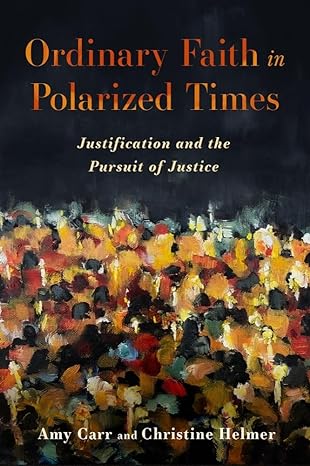
Ordinary Faith in Polarized Times
By
2.16.24 |
Symposium Introduction
Panelists
Rachel Contos
Constantin Plaul
André Munzinger
Robert Orsi
Jason Springs
Marianne Burkhard, OSB
Avweroswo Akpojaro Jr.
Overview
Christians in the United States and around the world are politically polarized today, unable to speak to one another across deep divisions regarding urgent social issues. Ordinary Faith in Polarized Times: Justification and the Pursuit of Justice addresses this dire reality by offering a theological framework for Christian justice-seeking. Amy Carr and Christine Helmer draw on Paul’s theology to center the idea of justification by faith in Christ as the primary ground of Christian belonging and community.
This approach yields a theology of ordinary faith that resists the temptation to equate Christian identity with the performance of a heroic “here I stand” posture against moral and political positions felt to be inimical to a properly Christian life. An ordinary faith situates Christian identity on a baptismal belonging to Christ. Baptism draws Christians into the messy process of discerning together the shape of justice in and through the Beloved Community. With justification by faith as the touchstone of Christian unity, Ordinary Faith in Polarized Times reveals how Christians who inhabit different ethical and political positions can navigate the disorientations and reorientations that arise when they debate what justice-seeking looks like from within the body of Christ.
Carr and Helmer articulate ways that justification by faith grounds Christian practices of affective listening and storytelling, even on the most contentious ethical questions today, with the hope that mutual conversation in and through the Beloved Community can get Christians who disagree oriented towards each other again for the good of the world.
Reviews and Endorsements
Amy Carr and Christine Helmer make a valuable Lutheran contribution to the ongoing ecumenical gift exchange in theology and ethics. In recalling us to a shared, ‘ordinary’ Christian identity founded in justification through faith by Christ, they invite fresh and careful reconsideration of the connection between that identity and the work of seeking justice. This crucial endeavor involves giving a properly theological account of the possibility and importance of patient encounter, reflection, and dialogue in our fractious and polarized cultural moment. What emerges is an attractive vision of the practice of justification which serves the life of the Beloved Community, the hope of the world.~Philip G. Ziegler, Chair of Christian Dogmatics, University of Aberdeen
By beginning with ‘ordinary faith’—the conviction that our identity is secured by grace rather than by any ethical or political performance—Carr and Helmer provide a framework for moral discernment in an ecclesial context where there often seems little on offer except silence or shouting. Addressing some of the most deeply divisive issues in the contemporary landscape, they evoke a refreshing vision of the Beloved Community, in which ‘living into the spacious grace of God’ entails a commitment to hear and engage the insights of all members of Christ’s body—especially those with whom we disagree.~Ian A. McFarland, Robert W. Woodruff Professor of Theology, Candler School of Theology, Emory University
This book speaks faithfully, compellingly, and earnestly into the current crises of politically divided Christians in the US today, providing brilliant re-framings of core Christian commitments to offer sacred spaces of generative engagement and the possibilities of transforming ‘high conflict into good conflict.’ Carr and Helmer deliver multiple hopeful avenues through which Christians from radically opposing positions might prioritize revolutionary listening, transformative love, and practices of Beloved Community.~G. Sujin Pak, Dean of the School of Theology, Boston University
Carr and Helmer argue that the task of justice-seeking needs to be grounded theologically, specifically in justification, through which Christians receive their primary identity and belonging. Their approach to navigating diverse and often opposing views of justice is compelling and refreshing. No topic is off-limits, as they illustrate with chapters on the contentious issues of abortion and Christian participation in politics. This much-needed volume should be read by Christian leaders everywhere.~Cheryl Peterson, Academic Dean, Wartburg Theological Seminary
Carr and Helmer tackle the difficult, some might say impossible, task of addressing polarization and entrenched divisions in the Christian community over hot-button issues. Theirs is a grace-oriented approach that seeks common ground in a shared baptism in Christ in order to explore how justification can establish a renewed way of being in the world. Though readers will find aspects with which to agree and disagree, I applaud their efforts to build bridges across divides, to generate justice-seeking conversation that takes theology seriously, and to root discourse and relationships across camps by appealing first and foremost to the undeserved grace that Christ offers believers.~Jennifer Powell McNutt, FRHistS, Franklin S. Dyrness Chair, Associate Professor of Theology and History of Christianity, Wheaton College

